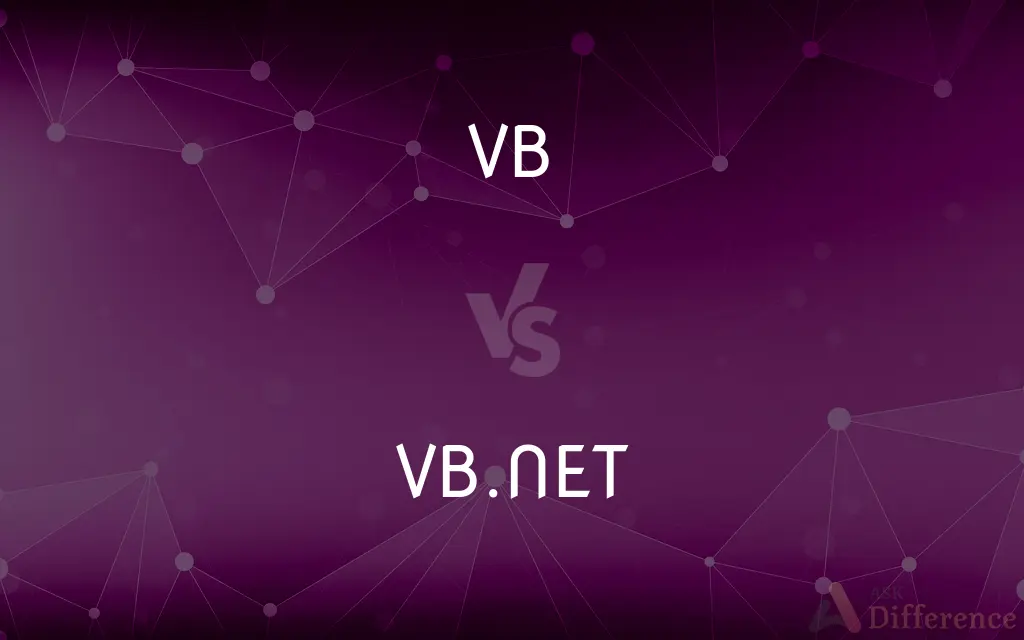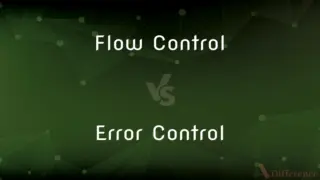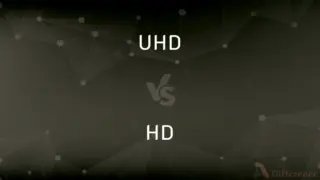VB vs. VB.NET — What's the Difference?
By Tayyaba Rehman & Urooj Arif — Published on February 4, 2024
VB (Visual Basic) is a programming language focused on ease of use and rapid application development, while VB.NET is an enhanced version that integrates the .NET framework, offering more powerful tools and features.

Difference Between VB and VB.NET
Table of Contents
ADVERTISEMENT
Key Differences
VB, short for Visual Basic, is a programming language developed by Microsoft. It was designed to be easily learned and used for developing Windows applications. VB.NET, on the other hand, is a version of Visual Basic that was re-engineered to work with the .NET framework. It incorporates many modern programming concepts that VB lacks, making it more versatile but also more complex.
VB is characterized by its simplicity and an event-driven programming model. It's great for beginners due to its straightforward syntax and approachability. VB.NET, while retaining some of the simplicity of VB, extends its capabilities with object-oriented programming, improved error handling, and support for a wide range of .NET libraries and features.
One key difference is that VB is not object-oriented by design, which limits its capability in large-scale application development. VB.NET embraces object-oriented programming (OOP), allowing developers to create more modular, scalable, and maintainable code.
Another significant difference lies in the runtime environment. VB code is executed within the context of the COM (Component Object Model) architecture, which is less efficient and secure compared to the modern .NET framework used by VB.NET. This makes VB.NET more suitable for web and enterprise applications.
Finally, VB’s compatibility is mostly limited to Windows-based systems, whereas VB.NET, leveraging the .NET framework, supports multiple platforms and has better integration with web technologies, making it a better choice for contemporary software development.
ADVERTISEMENT
Comparison Chart
Programming Paradigm
Procedural, event-driven
Object-oriented, event-driven
Framework
COM-based
.NET Framework
Error Handling
Basic error handling with "On Error"
Structured exception handling
Platform Support
Primarily Windows
Cross-platform with .NET Core
Development Capabilities
Limited to desktop applications
Extensive, including web and mobile apps
Compare with Definitions
VB
Supports rapid application development (RAD) with its intuitive drag-and-drop interface.
I used VB's RAD features to design the user interface of my app.
VB
Known for its ease of use, especially for beginners in programming.
My first program was a 'Hello World' in VB.
VB
A programming language developed by Microsoft for building Windows applications.
I created a simple calculator using VB.
VB
Integrates well with Microsoft Office applications, making automation tasks straightforward.
I automated Excel reports using VB scripts.
VB
An event-driven language that simplifies GUI application development.
Using VB, I quickly developed a custom form for data entry.
VB
Abbreviation of verb
Common Curiosities
What is VB.NET?
VB.NET is an advanced version of VB, integrated with the .NET framework, offering enhanced features and capabilities.
Is VB object-oriented?
VB is not inherently object-oriented; it is more procedural and event-driven.
Is VB.NET suitable for web applications?
Yes, VB.NET is well-suited for web application development, especially with ASP.NET.
Can VB applications run on Linux or Mac?
VB applications are mostly limited to Windows, though some compatibility exists via emulators.
What is VB?
VB is a programming language developed by Microsoft, focused on ease of use for Windows application development.
Can VB be used for web development?
VB is primarily designed for Windows applications, though limited web capabilities exist via ASP.
What are the object-oriented features of VB.NET?
VB.NET supports full object-oriented programming including inheritance, encapsulation, and polymorphism.
Does VB.NET support mobile app development?
VB.NET can be used for mobile app development, particularly through Xamarin in the .NET ecosystem.
Are VB and VB.NET syntactically similar?
Yes, VB.NET retains much of VB's syntax, but with additional features and enhancements.
How does error handling differ in VB and VB.NET?
VB uses basic error handling, while VB.NET employs structured exception handling for more robust control.
How does VB.NET improve upon VB for large applications?
VB.NET's object-oriented capabilities and .NET framework integration make it more scalable and maintainable.
Is VB still being updated by Microsoft?
Microsoft has largely shifted focus to VB.NET, with VB receiving limited updates.
Can VB be used for large-scale applications?
While possible, VB's lack of object-oriented features makes it less suitable for large-scale applications.
Is VB.NET cross-platform?
With the advent of .NET Core, VB.NET can be used for cross-platform development.
Can VB and VB.NET code be mixed in a project?
It's possible to interoperate, but integrating VB and VB.NET code can be complex and is generally not recommended.
Share Your Discovery

Previous Comparison
Flow Control vs. Error Control
Next Comparison
UHD vs. HDAuthor Spotlight
Written by
Tayyaba RehmanTayyaba Rehman is a distinguished writer, currently serving as a primary contributor to askdifference.com. As a researcher in semantics and etymology, Tayyaba's passion for the complexity of languages and their distinctions has found a perfect home on the platform. Tayyaba delves into the intricacies of language, distinguishing between commonly confused words and phrases, thereby providing clarity for readers worldwide.
Co-written by
Urooj ArifUrooj is a skilled content writer at Ask Difference, known for her exceptional ability to simplify complex topics into engaging and informative content. With a passion for research and a flair for clear, concise writing, she consistently delivers articles that resonate with our diverse audience.













































